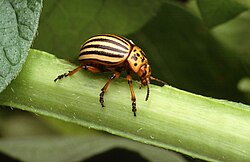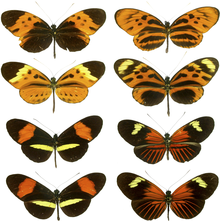| |
|
|
Ecology
|
|
Ecology (from Ancient Greek οἶκος (oîkos) 'house' and -λογία (-logía) 'study of') is the natural science of the relationships among living organisms and their environment. Ecology considers organisms at the individual, population, community, ecosystem, and biosphere levels. Ecology overlaps with the closely related sciences of biogeography, evolutionary biology, genetics, ethology, and natural history. Ecology is a branch of biology, and is the study of abundance, biomass, and distribution of organisms in the context of the environment. It encompasses life processes, interactions, and adaptations; movement of materials and energy through living communities; successional development of ecosystems; cooperation, competition, and predation within and between species; and patterns of biodiversity and its effect on ecosystem processes. Ecology has practical applications in conservation biology, wetland management, natural resource management (agroecology, agriculture, forestry, agroforestry, fisheries, mining, tourism), urban planning (urban ecology), community health, economics, basic and applied science, and human social interaction (human ecology). The word ecology (German: Ökologie) was coined in 1866 by the German scientist Ernst Haeckel. The science of ecology as we know it today began with a group of American botanists in the 1890s. Evolutionary concepts relating to adaptation and natural selection are cornerstones of modern ecological theory. Ecosystems are dynamically interacting systems of organisms, the communities they make up, and the non-living (abiotic) components of their environment. Ecosystem processes, such as primary production, nutrient cycling, and niche construction, regulate the flux of energy and matter through an environment. Ecosystems have biophysical feedback mechanisms that moderate processes acting on living (biotic) and abiotic components of the planet. Ecosystems sustain life-supporting functions and provide ecosystem services like biomass production (food, fuel, fiber, and medicine), the regulation of climate, global biogeochemical cycles, water filtration, soil formation, erosion control, flood protection, and many other natural features of scientific, historical, economic, or intrinsic value. (Full article...) Selected article - Ecological fitting is "the process whereby organisms colonize and persist in novel environments, use novel resources or form novel associations with other species as a result of the suites of traits that they carry at the time they encounter the novel condition". It can be understood as a situation in which a species' interactions with its biotic and abiotic environment seem to indicate a history of coevolution, when in actuality the relevant traits evolved in response to a different set of biotic and abiotic conditions. The simplest form of ecological fitting is resource tracking, in which an organism continues to exploit the same resources, but in a new host or environment. In this framework, the organism occupies a multidimensional operative environment defined by the conditions in which it can persist, similar to the idea of the Hutchinsonian niche. In this case, a species can colonize new environments (e.g. an area with the same temperature and water regime), form new species interactions (e.g. a parasite infecting a new host), or both, which can lead to the misinterpretation of the relationship as coevolution, although the organism has not evolved and is continuing to exploit the same resources it always has. The more strict definition of ecological fitting requires that a species encounter an environment or host outside of its original operative environment and obtain realized fitness based on traits developed in previous environments that are now co-opted for a new purpose. This strict form of ecological fitting can also be expressed either as colonization of new habitat or the formation of new species interactions. (Full article...) Selected image -General imagesThe following are images from various ecology-related articles on Wikipedia.
Related WikiProjectsThings you can do
Entries here consist of Good and Featured articles, which meet a core set of high editorial standards.
Müllerian mimicry is a natural phenomenon in which two or more well-defended species, often foul-tasting and sharing common predators, have come to mimic each other's honest warning signals, to their mutual benefit. The benefit to Müllerian mimics is that predators only need one unpleasant encounter with one member of a set of Müllerian mimics, and thereafter avoid all similar coloration, whether or not it belongs to the same species as the initial encounter. It is named after the German naturalist Fritz Müller, who first proposed the concept in 1878, supporting his theory with the first mathematical model of frequency-dependent selection, one of the first such models anywhere in biology. Müllerian mimicry was first identified in tropical butterflies that shared colourful wing patterns, but it is found in many groups of insects such as bumblebees, and other animals such as poison frogs and coral snakes. The mimicry need not be visual; for example, many snakes share auditory warning signals. Similarly, the defences involved are not limited to toxicity; anything that tends to deter predators, such as foul taste, sharp spines, or defensive behaviour can make a species unprofitable enough to predators to allow Müllerian mimicry to develop. (Full article...) Selected biography - Marie-Josée Fortin FRSC (born October 21, 1958) is an ecologist and Professor in the Department of Ecology and Evolutionary Biology at the University of Toronto. Fortin holds the Tier 1 Canada Research Chair in Spatial Ecology at the University of Toronto. In 2016, she was elected as a Fellow of the Royal Society of Canada. (Full article...) Did you know (auto-generated)
Selected quote -
Ecology news
Additional News Highlights
Selected publication -The Journal of Wild Culture was a short-lived magazine combining, among other things, artistic perspectives on ecology and environmental issues. It was published in Toronto from 1986 to 1991. The Journal of Wild Culture (JWC) was the literary organ of The Society for the Preservation of Wild Culture (SPWC), an arts organization devoted to exploring environmental and ecological issues from an artistic perspective, and ideas provoked by the term "wild culture". The magazine and the activities of the Society were best known for carrying on the nature-culture discourse in a "quirky and innovative" manner, and for influencing the way serious themes could be delivered with a sense of play and timeliness. (Full article...) Related portalsMore did you know -Related articlesAssociated WikimediaThe following Wikimedia Foundation sister projects provide more on this subject:
Web resourcesPreview warning: Page using Template:Div col with unknown parameter "1 = 2"; use colwidth= to specify column size
Discover Wikipedia using portals |















































